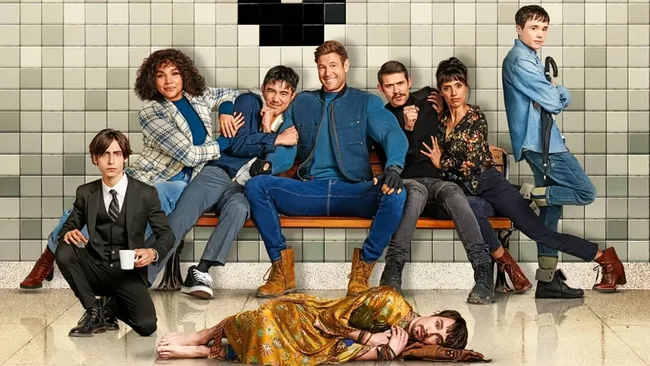
“The Umbrella Academy” returns for its final season with the characters losing their powers and beginning normal lives. Fans were excited to see how the story would come to a satisfying conclusion, but many aspects of the final season seem to have reverted to the first season’s struggle to find its footing.
The show is an adaption of the comic series by Gerard Way where 40 superpowered children were miraculously born on Oct. 1, 1989. Billionaire Sir Reginald Hargreeves managed to adopt seven of them and created the Umbrella Academy. After a rough falling-out and several decades apart, the seven are reunited after Hargreeves’ death to prevent the apocalypse, and the work to prevent the end of the world over the course of the show.
In the newest installment, the humorous charm of previous seasons is almost entirely absent, and new characters are not given enough time to develop, while plot points are quickly brushed off. Characters that had begun to grow in recent seasons seemed to revert back to their season one mentalities.
The most disappointing aspect of the season is the lack of familial connections between the Hargreeves siblings. This was always a highlight of the show considering the strained relationships between the characters due to shared trauma. At times, it seems like the writers forget the Hargreeves are supposed to be a family that love each other despite their differences.
There are not many moments between the siblings this season that reinforce the bonds that made the show so special. Most of the season’s plot focuses on tying up loose ends or fleshing out new characters. This was an odd choice considering the season’s shortened runtime compared to the first three seasons.
Something that has not changed is the actors’ performances themselves. The show’s acting is brilliant, with each actor truly embodying their role. Aidan Gallagher’s performance as Five is as charismatic and witty as ever. However, the actors can only do so much with the underwritten scripts they’ve been given.
Robert Sheehan’s Klaus undergoes a significant character arc before reverting to his original season one state. Tom Hopper’s Luther suffers a drastic personality shift and starts working at a nightclub instead of being the calm, collected leader he once was. Sometimes it seems as though the writers forgot certain aspects of the characters’ personalities entirely.
Characters like Luther and Klaus only shined for a few scenes before new characters stole their limited screen time. David Castañeda’s Diego is reduced to a gag character, lacking his cool, mysterious exterior he had in the first three seasons. Elliot Page’s Viktor displays the most growth and receives a proper focus compared to the rest of the cast. However, this development is strained and could have been expanded with more episodes.
Viktor has a scene in which he uses his powers against his abusive father, Reginald Hargreeves. However, Page’s acting mostly consists of overacting that feels disingenuous rather than emotional. The scene itself feels empty and lacks the depth previous seasons had during powerful moments. In fact, many seemingly emotional moments between the Hargreeves fall flat in regards to humor and emotional weight.
Many fans are outraged over a certain relationship between two characters that had never had any romantic tension in the previous three seasons. This relationship only emerges in the second to last episode of the season and is given no time to develop. Additionally, one of the characters was already in a relationship previously. This was jarringly unrealistic for both of the characters and took up an episode of runtime that could have been dedicated to the siblings’ relationships.
Ultimately, the underwhelming ending of the show leaves the Hargreeves siblings making a difficult decision for the sake of the timeline. Unfortunately, the message of this conclusion is
harmful, as the abused Hargreeves siblings are implied to be the source of all their problems and are forced to make unfair sacrifices in order to save the world.
The previous three seasons were dedicated to the message of overcoming and recovering from familial abuse, leaving the characters with a way to face their challenges together as a
family. Perhaps it was due to the limited runtime, but the show abandoned this message entirely and concluded on an off-putting note.
The post “The Umbrella Academy” misses the mark appeared first on Technique.
